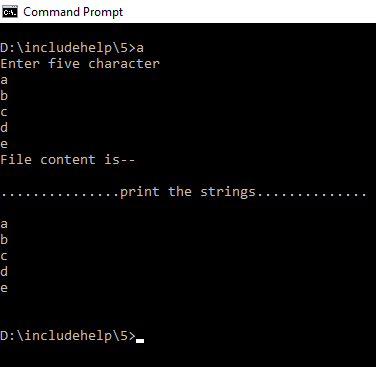Home »
C programs »
C stdio.h library functions programs
fgetc() function in C language with Example
Here, we are going to learn about the fgetc() function of library header stdio.h in C language with its syntax, example.
Submitted by Souvik Saha, on January 06, 2019
fgetc() function in C
Prototype:
int fgetc(FILE *filename);
Parameters:
FILE *filename
Return type: int
Use of function:
In the file handling, through the fgetc() function we take the next character from the input stream and increments the file pointer by one. The prototype of the function fgetc() is: int fgetc(FILE* filename);
It returns an integer value which is conversion of an unsigned char. It also returns EOF which also in turns an integer value.
fgetc() example in C
#include <stdio.h>
#include <stdlib.h>
int main()
{
//Initialize the file pointer
FILE* f;
char ch;
//Create the file for write operation
f = fopen("includehelp.txt", "w");
printf("Enter five character\n");
for (int i = 0; i < 5; i++) {
//take the characters from the users
scanf("%c", &ch);
//write back to the file
fputc(ch, f);
//clear the stdin stream buffer
fflush(stdin);
}
//close the file after write operation is over
fclose(f);
//open a file
f = fopen("includehelp.txt", "r");
printf("File content is--\n");
printf("\n...............print the strings..............\n\n");
while (!feof(f)) {
//takes the characters in the character array
ch = fgetc(f);
//and print the characters
printf("%c\n", ch);
}
fclose(f);
return 0;
}
Output

C stdio.h Library Functions Programs »
Advertisement
Advertisement